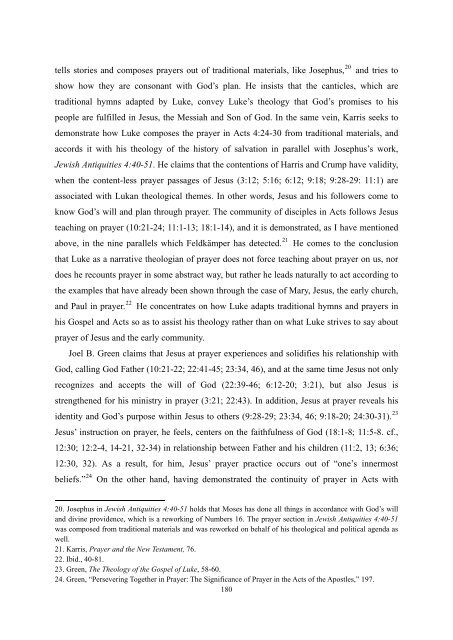the role of the lukan parables in terms of the purpose of luke's gospel
the role of the lukan parables in terms of the purpose of luke's gospel
the role of the lukan parables in terms of the purpose of luke's gospel
Create successful ePaper yourself
Turn your PDF publications into a flip-book with our unique Google optimized e-Paper software.
tells stories and composes prayers out <strong>of</strong> traditional materials, like Josephus, 20 and tries to<br />
show how <strong>the</strong>y are consonant with God’s plan. He <strong>in</strong>sists that <strong>the</strong> canticles, which are<br />
traditional hymns adapted by Luke, convey Luke’s <strong>the</strong>ology that God’s promises to his<br />
people are fulfilled <strong>in</strong> Jesus, <strong>the</strong> Messiah and Son <strong>of</strong> God. In <strong>the</strong> same ve<strong>in</strong>, Karris seeks to<br />
demonstrate how Luke composes <strong>the</strong> prayer <strong>in</strong> Acts 4:24-30 from traditional materials, and<br />
accords it with his <strong>the</strong>ology <strong>of</strong> <strong>the</strong> history <strong>of</strong> salvation <strong>in</strong> parallel with Josephus’s work,<br />
Jewish Antiquities 4:40-51. He claims that <strong>the</strong> contentions <strong>of</strong> Harris and Crump have validity,<br />
when <strong>the</strong> content-less prayer passages <strong>of</strong> Jesus (3:12; 5:16; 6:12; 9:18; 9:28-29: 11:1) are<br />
associated with Lukan <strong>the</strong>ological <strong>the</strong>mes. In o<strong>the</strong>r words, Jesus and his followers come to<br />
know God’s will and plan through prayer. The community <strong>of</strong> disciples <strong>in</strong> Acts follows Jesus<br />
teach<strong>in</strong>g on prayer (10:21-24; 11:1-13; 18:1-14), and it is demonstrated, as I have mentioned<br />
above, <strong>in</strong> <strong>the</strong> n<strong>in</strong>e parallels which Feldkämper has detected. 21 He comes to <strong>the</strong> conclusion<br />
that Luke as a narrative <strong>the</strong>ologian <strong>of</strong> prayer does not force teach<strong>in</strong>g about prayer on us, nor<br />
does he recounts prayer <strong>in</strong> some abstract way, but ra<strong>the</strong>r he leads naturally to act accord<strong>in</strong>g to<br />
<strong>the</strong> examples that have already been shown through <strong>the</strong> case <strong>of</strong> Mary, Jesus, <strong>the</strong> early church,<br />
and Paul <strong>in</strong> prayer. 22<br />
He concentrates on how Luke adapts traditional hymns and prayers <strong>in</strong><br />
his Gospel and Acts so as to assist his <strong>the</strong>ology ra<strong>the</strong>r than on what Luke strives to say about<br />
prayer <strong>of</strong> Jesus and <strong>the</strong> early community.<br />
Joel B. Green claims that Jesus at prayer experiences and solidifies his relationship with<br />
God, call<strong>in</strong>g God Fa<strong>the</strong>r (10:21-22; 22:41-45; 23:34, 46), and at <strong>the</strong> same time Jesus not only<br />
recognizes and accepts <strong>the</strong> will <strong>of</strong> God (22:39-46; 6:12-20; 3:21), but also Jesus is<br />
streng<strong>the</strong>ned for his m<strong>in</strong>istry <strong>in</strong> prayer (3:21; 22:43). In addition, Jesus at prayer reveals his<br />
identity and God’s <strong>purpose</strong> with<strong>in</strong> Jesus to o<strong>the</strong>rs (9:28-29; 23:34, 46; 9:18-20; 24:30-31).<br />
Jesus’ <strong>in</strong>struction on prayer, he feels, centers on <strong>the</strong> faithfulness <strong>of</strong> God (18:1-8; 11:5-8. cf.,<br />
12:30; 12:2-4, 14-21, 32-34) <strong>in</strong> relationship between Fa<strong>the</strong>r and his children (11:2, 13; 6:36;<br />
12:30, 32). As a result, for him, Jesus’ prayer practice occurs out <strong>of</strong> “one’s <strong>in</strong>nermost<br />
beliefs.” 24<br />
On <strong>the</strong> o<strong>the</strong>r hand, hav<strong>in</strong>g demonstrated <strong>the</strong> cont<strong>in</strong>uity <strong>of</strong> prayer <strong>in</strong> Acts with<br />
20. Josephus <strong>in</strong> Jewish Antiquities 4:40-51 holds that Moses has done all th<strong>in</strong>gs <strong>in</strong> accordance with God’s will<br />
and div<strong>in</strong>e providence, which is a rework<strong>in</strong>g <strong>of</strong> Numbers 16. The prayer section <strong>in</strong> Jewish Antiquities 4:40-51<br />
was composed from traditional materials and was reworked on behalf <strong>of</strong> his <strong>the</strong>ological and political agenda as<br />
well.<br />
21. Karris, Prayer and <strong>the</strong> New Testament, 76.<br />
22. Ibid., 40-81.<br />
23. Green, The Theology <strong>of</strong> <strong>the</strong> Gospel <strong>of</strong> Luke, 58-60.<br />
24. Green, “Persever<strong>in</strong>g Toge<strong>the</strong>r <strong>in</strong> Prayer: The Significance <strong>of</strong> Prayer <strong>in</strong> <strong>the</strong> Acts <strong>of</strong> <strong>the</strong> Apostles,” 197.<br />
180<br />
23
















